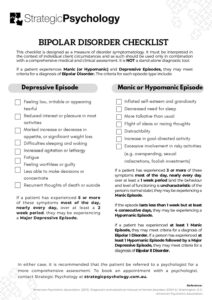
Bipolar Disorder Checklist
471 KB
This checklist is designed as a measure of disorder symptomatology. It must be interpreted in the context of individual client circumstances and as such should be used only in combination with a comprehensive medical and clinical assessment. It is NOT a stand-alone diagnostic tool.
If you experience Manic (Hypomanic) & Depressive Episodes, then you may require a diagnosis of Bipolar Disorder. Check out our bipolar disorder checklist.
Depressive Episode
Feeling low, irritable or appearing tearful
Reduced interest or pleasure in most activities
Marked increase or decrease in appetite, or significant weight loss
Difficulties sleeping and waking
Increased agitation or lethargy
Fatigue
Feeling worthless or guilty
Less able to make decisions or concentrate
Recurrent thoughts of death or suicide
If a patient has experienced 5 or more of these symptoms most of the day, nearly every day, over at least a 2 week period, they may be experiencing a Major Depressive Episode.
Manic or Hypomanic Episode
Inflated self-esteem and grandiosity
Decreased need for sleep
More talkative than usual
Flight of ideas or racing thoughts
Distractibility
Increase in goal-directed activity
Excessive involvement in risky activities (e.g. overspending, sexual indiscretions, foolish investments)
If a patient has experienced 3 or more of these symptoms most of the day, nearly every day, over at least a 1 week period (and the behaviour and level of functioning is uncharacteristic of the person’s normal state), they may be experiencing a Manic Episode.
If the episode lasts less than 1 week but at least 4 consecutive days, they may be experiencing a Hypomanic Episode.
If a patient has experienced at least 1 Manic Episode, they may meet criteria for a diagnosis of Bipolar I Disorder. If a person has experienced at least 1 Hypomanic Episode followed by a Major Depressive Episode, they may meet criteria for a diagnosis of Bipolar II Disorder.
In either case, it is recommended that the patient be referred to a psychologist for a more comprehensive assessment. To book an appointment with a psychologist, contact Strategic Psychology on (02) 6262 6157 or email support@strategicpsychology.com.au.
Reference: American Psychiatric Association. (2013). Diagnostic and statistical manual of mental disorders (DSM-5). Washington, D.C.: American Psychiatric Association.
